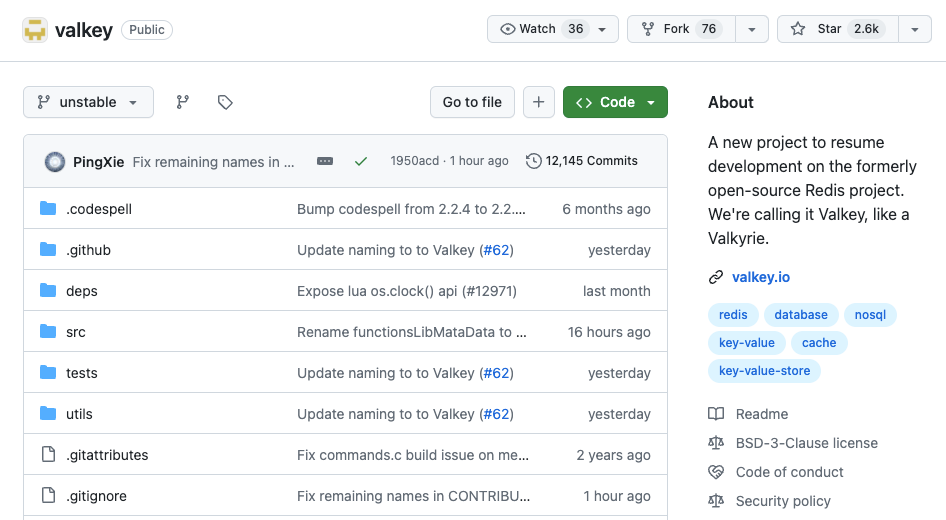
Security News
Meet Socket at Black Hat Europe and BSides London 2025
Socket is heading to London! Stop by our booth or schedule a meeting to see what we've been working on.


Sarah Gooding
March 29, 2024
Last week Redis blindsided its contributors and community by unilaterally changing its license so that it’s no longer open source. Redis broke its explicit commitment to remain under the BSD 3-Clause License forever, which angered contributors who immediately began working to fork the software.
One of the forks with momentum was started by Amazon ElastiCache principal engineer Madelyn Olson, one of Redis’ top contributors, who has been working with former contributors to take the OSS version forward. They landed on the name Valkey, similar to a Valkyrie but also reflecting the project’s core function as a high performance key-value store.

The project already has more than 2.6 stars on GitHub, making it one of the more popular Redis forks behind the existing KeyDB fork. Valkey contributors are keeping the previous BSD-3-Clause license, despite its vulnerability to relicensing, but are putting the project under a foundation.
Valkey is forming a new community under the umbrella of the Linux Foundation, following an open governance model that is community-driven. The foundation reports that the project has already assembled a technical leadership committee of several former Redis contributors.
Amazon Web Services (AWS), Google Cloud, Oracle, Ericsson, and Snap Inc. are among the largest industry participants supporting the project.
“We remain focused on our role as stewards of the Redis project, and our mission of investing in the Redis source available product, the ecosystem, the developer experience, and serving our customers,” Redis CEO Rowan Trollope told The New Stack. “Innovation has been and always will be the differentiating factor between the success of Redis and any alternative solution.”
Valkey contributors, who are intimately acquainted with how Redis has differentiated itself, have planned from the outset to focus on innovating and moving forward on the previous roadmap:
To continue improving on this important technology and allow for unfettered distribution of the project, the community created Valkey, an open source high performance key-value store. Valkey supports the Linux, macOS, OpenBSD, NetBSD, and FreeBSD platforms. In addition, the community will continue working on its existing roadmap including new features such as a more reliable slot migration, dramatic scalability and stability improvements to the clustering system, multi-threaded performance improvements, triggers, new commands, vector search support, and more.
Paralleling the recent relicensing of Elasticsearch in 2021, this follows the trend of smaller companies abandoning open source licenses while casting the blame on cloud providers. However, Amazon once again stands out as a continuing advocate for open source software.
“Open source Redis is one of today's most popular databases, and that success has been driven in large part by its active, thriving community of contributors. Through the creation of Valkey, many of the former maintainers that contributed to open source Redis are helping keep the project open for everyone, and the industry can further support them so the project can continue to evolve and improve for our customers and the community at large,” AWS VP of Relational Databases said.
“We are excited to see the groundswell of support from both the community and a range of companies that all share our vision that the best way to maintain this vibrant project is through open source governance, with contributions from all.”
Subscribe to our newsletter
Get notified when we publish new security blog posts!
Try it now

Security News
Socket is heading to London! Stop by our booth or schedule a meeting to see what we've been working on.

Security News
OWASP’s 2025 Top 10 introduces Software Supply Chain Failures as a new category, reflecting rising concern over dependency and build system risks.

Research
/Security News
Socket researchers discovered nine malicious NuGet packages that use time-delayed payloads to crash applications and corrupt industrial control systems.